Recent Fire Damage Posts
How to Put Out an Electrical Fire
1/17/2024 (Permalink)
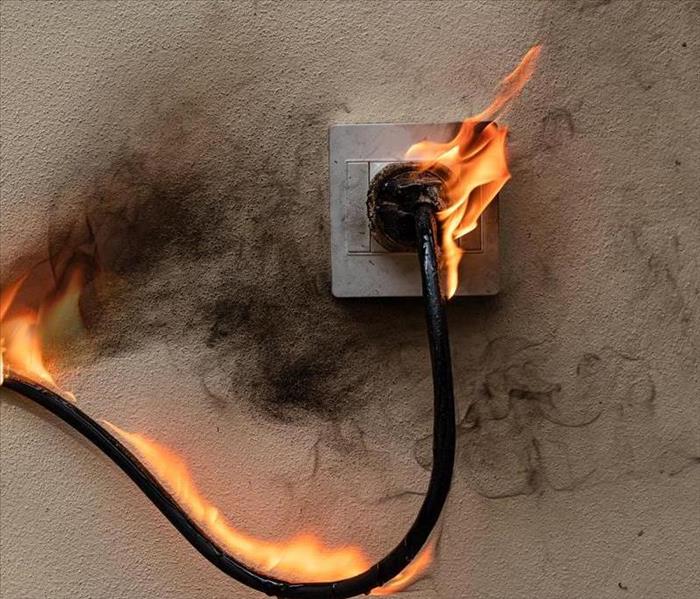 Electrical failures and malfunctions also account for the highest share of civilian deaths and direct property damage.
Electrical failures and malfunctions also account for the highest share of civilian deaths and direct property damage.
Electricity is an essential part of life. From lights to heating systems to TV’s, it provides the energy for most powered objects in a house. Electricity is important to have in every home, but it can also be extremely dangerous. According to the National Fire Protection Association, electrical failures or malfunctions are the second leading cause of home fire in the United States. Electrical failures and malfunctions also account for the highest share of civilian deaths and direct property damage.
If an electrical fire were to break out in your home, here are actions that you should do immediately:
- Cut off the Electricity – If the device that is causing the fire is found and you can safely reach the cord, unplug it.
- Add Sodium Bicarbonate – If the fire is small, you may put it out by pouring baking soda on it.
- Don’t Use Water – Using water to put out an electrical fire can put you at risk of being shocked or electrocuted because water is a natural conductor of electricity. Water also may cause the fire to spread by conducting electricity throughout the room and potentially igniting flammable materials.
- Remove the Oxygen Source – An electrical fire may also be put out by removing the oxygen source with a heavy blanket or clothing if the fire is small.
- Check Your Fire Extinguisher – Electrical fires are considered a Class C Fire, which means that you will need to have an extinguisher that is appropriate for this type of fire. Residential fire extinguishers are often multi-purpose and labeled as ABC, but it is very important to make sure that it is before using it on an electrical fire.
Fireplace Safety
1/3/2024 (Permalink)
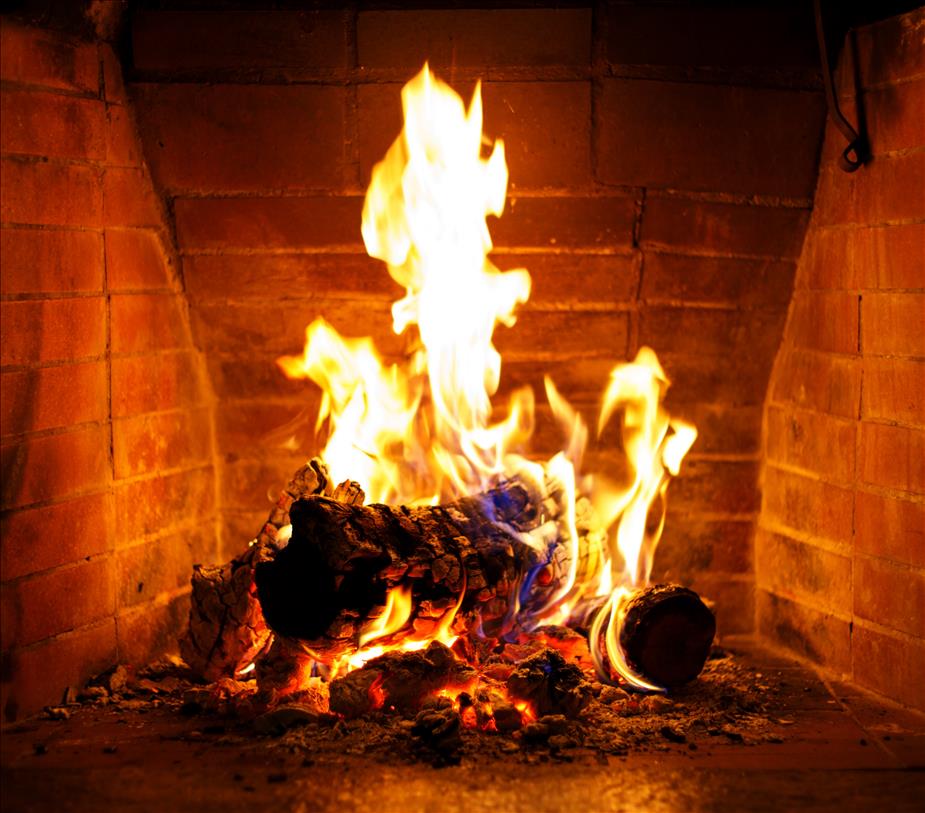 Fire and smoke damage is especially destructive.
Fire and smoke damage is especially destructive.
In the winter, you may be using your fireplace to heat up your home. Residential fire safety is crucial, especially when you have open flames within your home. It’s important to know that any type of fireplace, whether wood-burning, gas, or electric, creates potential danger to your home and loved ones.
Fireplace Safety Tips
- Open a window while the fire is it.
- Be sure the damper or flue is open before lighting or starting a fire, and until embers have completely stopped burning, to draw smoke out of the house.
- Check the damper by looking up into the chimney with a flashlight or mirror.
- Use smaller pieces of dry and well-aged wood for home fire safety, avoiding wet or green wood, which cause more smoke and soot buildup in the chimney.
- Have a professional check the chimney annually.
- When cleaning a fireplace, remove ashes from previous fires, keeping levels to 1 inch or less for less smoke
- Check for animal nests or other blockages that could prevent smoke from escaping.
- Make sure the area around the fireplace is clear of anything that is potentially flammable.
- Never leave a fire in the fireplace unattended and be sure it’s completely out before going to bed or leaving the house.
- Home fireplace safety should include keeping a fire extinguisher on hand.
Fire and smoke damage is especially destructive. In many instances, your Saginaw property will also suffer from water damage from firefighting efforts. SERVPRO® has specialized equipment, specific training, and certifications that allow us to restore your home to pre-fire condition "Like it never even happened."
Fire Threats Around the Holidays
11/7/2023 (Permalink)
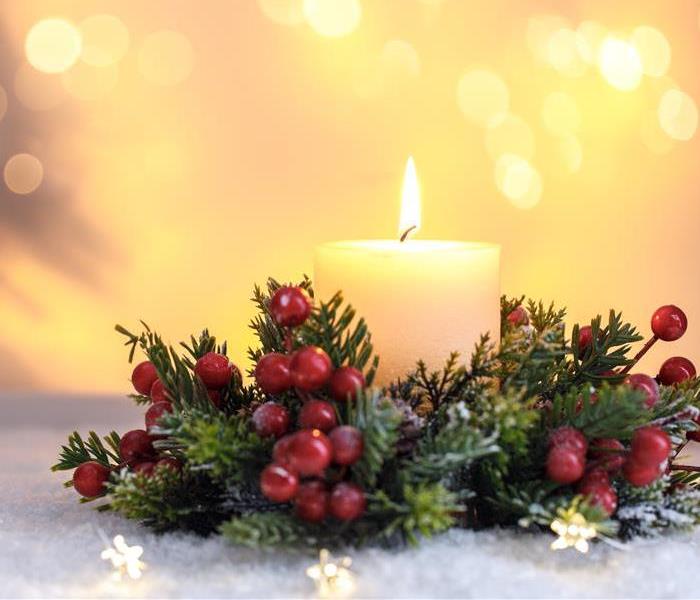 It is as important to keep safety top of mind with a small family gathering as it is with a large holiday party.
It is as important to keep safety top of mind with a small family gathering as it is with a large holiday party.
SERVPRO® fire restoration specialists say to use common sense and caution to help control risk of holiday season home fires!
In times when large holiday gatherings may not be possible, fire damage restoration specialists at SERVPRO® of Saginaw / Bay City say the focus on family decorating traditions and more intimate celebrations may take on extra significance. It is as important to keep safety top of mind with a small family gathering as it is with a large holiday party. We all enjoy bringing the glow of the holiday season to our homes with Christmas trees or menorahs and candlelight, but these statistics from the U.S. Fire Administration show how easy it is for home decorating to turn into a home disaster.
- The top three days for home candle fires are Christmas Day, New Year’s Day and New Year’s Eve.
- More than half of the home decoration fires in December are started by candles.
- A heat source too close to the Christmas tree causes one in every four winter fires.
- On average, one of every 52 reported home Christmas tree fires resulted in death.
SERVPRO® is an industry leader and provider of fire damage restoration services. For more fire prevention and fire safety tips and information about fire and water damage restoration services, call us at 989-752-8644.
Always Prioritize Safety as You Grill
8/7/2023 (Permalink)
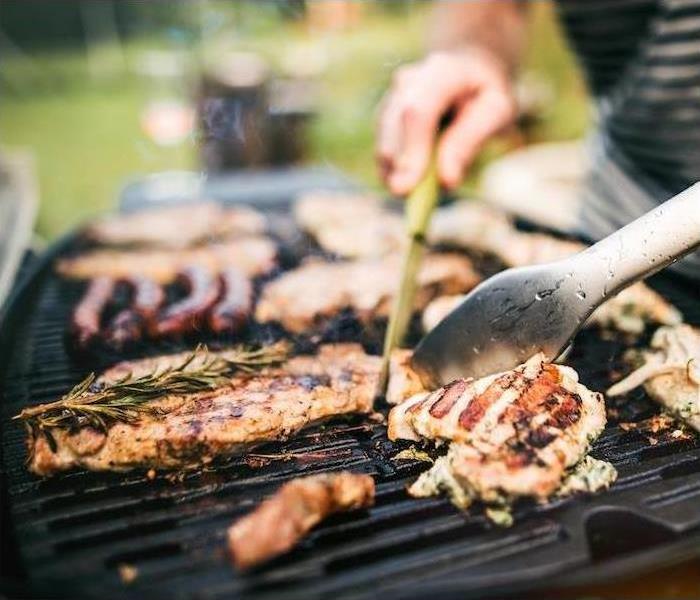 It is convenient to place your grill in a spot close to your home but giving yourself plenty of surrounding space is important in case of flare-ups.
It is convenient to place your grill in a spot close to your home but giving yourself plenty of surrounding space is important in case of flare-ups.
For us, enjoying summer is all about getting outside with family and firing up the grill, but safety is key to making sure this stays a fun activity. Grilling dangers are something many people do not discuss, but as with any open flame, the risk of a grill fire is there every time you light yours up. Fortunately, a bit of prevention goes a long way.
The U.S. Fire Administration reports grill fires occur at least 5,700 times every year, making them more prevalent than many realize. But grilling can be a fun and safe activity if you follow the proper fire safety protocols when you do it.
Keep Grilling Fun, Safe and Fire-Free
- Create a safe zone around your grill. It is convenient to place your grill in a spot close to your home but giving yourself plenty of surrounding space is important in case of flare-ups. Three feet is the recommended distance to have around your grill, free from wood, siding or any other flammable materials.
- Clean your grill grates often. By keeping your grill grates clean, you can keep the temperature inside your grill steadier and reduce the chances of a sudden fire starting. Built-on food particles can get extremely hot when the grill is in use, even suddenly igniting in some cases. A quick scrape after each grill session can go a long way in reducing this danger.
- Never leave the grill unattended. There is no safe way to ever leave a grill unattended, even if the lid is closed. Fires only take a second to start, so your best bet to circumvent damage is by always being nearby with a fire extinguisher just in case. Even for a quick break, it is best to have someone take over your grill station to keep a vigilant eye out.
- Inspect the grill regularly. The components of a grill are not made to last forever, and even if you are using yours regularly, you never know when something could finally give out. Before you ever light your grill, do a visual inspection to make sure everything looks like it is in good shape and there are no areas that could lead to a gas leak on your connectors.
Fireworks and Your Home
6/26/2023 (Permalink)
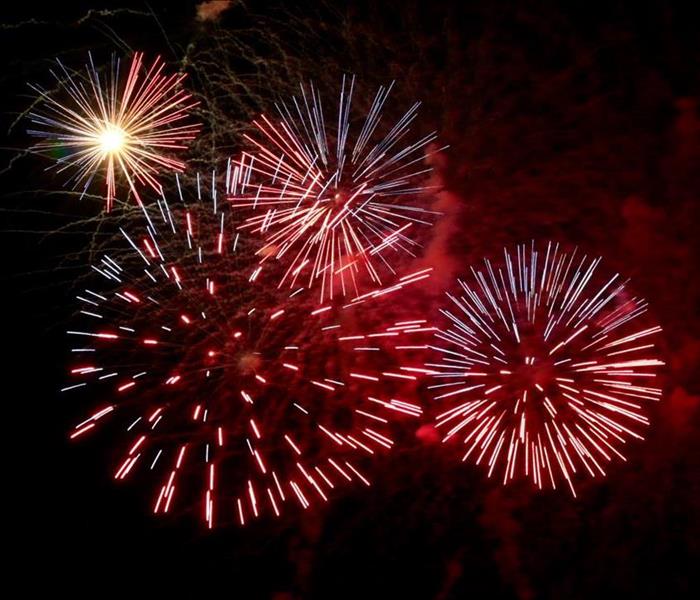 Call SERVPRO if your property suffers from fire damage as a result of using fireworks.
Call SERVPRO if your property suffers from fire damage as a result of using fireworks.
We all love watching fireworks light up the sky to celebrate the 4th of July, but sometimes during all the fun, we forget that fireworks have the potential to cause serious damage. To prevent your property from suffering fire damage this holiday season, follow these tips!
- Follow your state’s laws. Before purchasing or lighting fireworks off in a residential area, check to make sure that you aren’t breaking any state laws.
- Keep safety gear close by. Have a bucket of water and a fire extinguisher on standby in case of a fire emergency.
- Watch the weather. Don’t light fireworks during a drought or dry weather conditions. One stray spark can potentially cause a major fire that could impact your property.
- Watch for children. When lighting off fireworks, keep a close eye on children to make sure they aren’t handling anything dangerous or in harm’s way.
- Dispose of fireworks safely. Always douse burned fireworks with water before throwing them away. If a firework doesn’t go off, do NOT attempt to light it again.
Accidents can still happen, even when you use precautions. If your property suffers from fire damage as a result of using fireworks, SERVPRO is the team to call.
Smell Natural Gas?
6/12/2023 (Permalink)
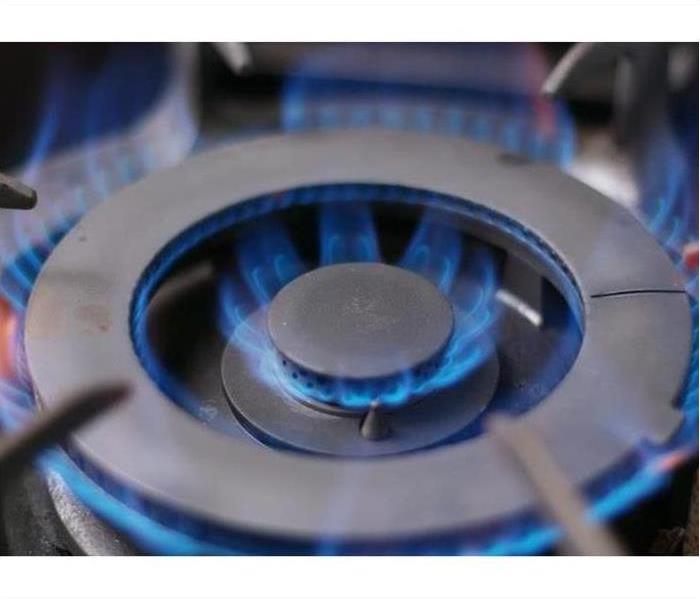 A gas fire can be extremely dangerous.
A gas fire can be extremely dangerous.
Gas fires continue to occur at an alarming rate and, sadly, they often result in much more dire consequences than fire damage. You can prevent a gas fire by recognizing the signs of a gas leak.
Determine if Your Home Utilizes Natural Gas
Before you learn the signs of a gas leak, you should determine which aspects of your home use natural gases. You may be at risk of a gas leak if any of the following appliances use the natural commodity:
- Oven
- Hot water heater
- AC unit
- Fireplace
- Dryer
- Heating system
If any of your appliances run on gas, invest in gas detectors, and remain vigilant for signs of a gas leak.
What to Do If You Suspect a Gas Leak
A gas leak can quickly lead to a gas fire which can quickly lead to a gas explosion. For this reason, it is imperative that you recognize the signs of a leak and take proper measures to prevent disaster:
- Check the stove: If it is safe to do so, walk over to your stove to make sure all the burners are off.
- Open the doors and windows: If you cannot find the source of the leak, open all the doors and windows to help the gases escape.
- Do not flip any switches: A light switch can cause a spark, which can cause an explosion. Keep all the lights off if you suspect a gas leak.
- Shut off your gas meter: If you do not know where your gas meter is located, now's the time to find it. If you smell gases, locate the meter, and turn it off.
A gas fire can be extremely dangerous. For this reason, the best thing you can do if you suspect a gas leak is to leave your home ASAP and call 911. If a fire does occur, the SERVPRO fire damage cleanup crew can help with the restoration process.
Preventing Grease Fires
5/8/2023 (Permalink)
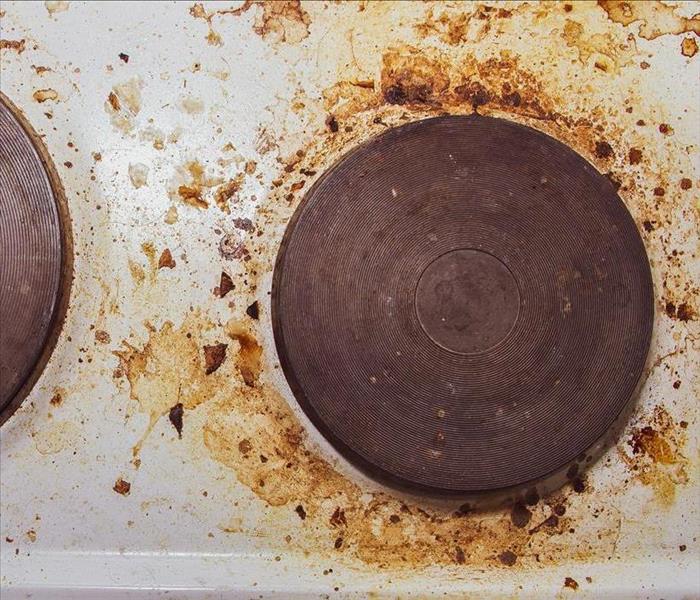 Grease fires are the most dangerous when it comes to cooking fires.
Grease fires are the most dangerous when it comes to cooking fires.
Grease fires are the most dangerous when it comes to cooking fires and are responsible for 1 in every 5 home fire deaths. Below are some tips on how to prevent and put out grease fires. These tips could help save your or a loved one's life.
Prevention
- Before you start cooking make sure the burner is cool and wipe up any spills.
- Pay attention to heat ratings for cooking oil. Some oils can be heated more than others before catching fire so if you are cooking and notice the oil starts to smoke that means it is close to catching fire.
- As soon as you start to see it smoke carefully remove the pan from the heat source.
- Avoid heating grease before putting food into it because when you drop food in it can make the grease splash out which in turn can cause grease burns or it can also hit the heat source and catch fire.
- Carefully clean spills as soon as they happen by first removing food from heat source, turning off heat source, and waiting for burner to cool.
- When deep frying, make sure you use a pan or cooking container big enough.
- Use a utensil that will allow you to put the food into the grease without dropping and without your hands coming close to the hot grease.
- Use a screen that covers the pan to reduce the chance of splattering outside the pan.
- If you are a new or inexperienced cook do not attempt to deep fry for the first time unless you have an experienced cook with you.
- NEVER add water to grease.
 Electrical failures and malfunctions also account for the highest share of civilian deaths and direct property damage.
Electrical failures and malfunctions also account for the highest share of civilian deaths and direct property damage.





 24/7 Emergency Service
24/7 Emergency Service





